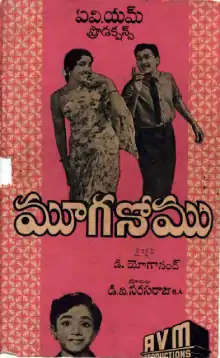Mooga Nomu
Mooga Nomu (transl. Mute Owe) is a 1969 Telugu-language drama film, produced M. Murugan, M. Saravanan and M. Kumaran by AVM Productions banner and directed by D. Yoganand. It stars Akkineni Nageswara Rao, Jamuna and music composed by R. Govardhanam. The film is a remake of the Tamil language movie Kalathur Kannamma (1960).[2]
| Mooga Nomu | |
|---|---|
 Poster | |
| Directed by | D. Yoganand |
| Produced by | M. Murugan M. Kumaran M. Saravanan M. Balasubramanian M. S. Guhan |
| Screenplay by | Javar Seetharaman |
| Story by | Javar Seetharaman |
| Based on | Kalathur Kannamma (1960) |
| Starring | Akkineni Nageswara Rao Jamuna |
| Music by | R. Govardhanam |
| Cinematography | P. Bhaskar Rao |
| Edited by | R. Vital |
Production company | |
Release date |
|
Running time | 168 mins |
| Country | India |
| Language | Telugu |
Plot
Venu (Akkineni Nageswara Rao) is the only son of Rao Bahadoor Raja Veera Venkata Satyanarayana Gopalam (S. V. Ranga Rao), the Zamindar of Ratnagiri. Gauri (Jamuna) is the daughter of Somaiah (Chittoor V. Nagaiah), a farmer in their estate. They fall in love and Venu marries Gauri secretly in a temple. After that Venu has to go abroad for higher studies. During his absence, the Zamindar learns of the marriage and orders Gauri to forget his son, due to gratitude to the Zamindar, Gauri promises never to mention their marriage to anyone. At that time Gauri is pregnant, the Zamindar arranges for the stay of Somaiah and Gauri in a nearby town, where Gauri gives birth to a baby boy, to protect Gauri from insults, Somaiah leaves the baby in an orphanage and lies that the child died.
Meanwhile, Venu returns, he learns that Gauri and his inquiries lead him to believe that Gauri had led an immoral life. Grief-stricken, he travels from place to place to forget Gauri and takes to drinking as a last resort. After 8 years, Venu and Gauri's son Gopi (Master Brahmaji) grows up into an intelligent boy and is living in the orphanage. Gauri becomes a teacher in the same school and feels attracted to Gopi. Venu is invited to the orphanage by Sowkar Subbaiah, a rich merchant who wants to marry his daughter Rajani (Vennira Aadai Nirmala) to him, to preside over a school function. Venu takes a fascination for Gopi, who acts in the school drama. After the drama ends, he encounters Gauri again and orders them to dismiss her.
Due to unknown affection, Venu takes Gopi with him to his house. At Gopi's insistence, Venu stops drinking and to give him a mother, also decides to marry Rajani. A seriously ill Somaiah confesses to Gowri that her child is not dead and reveals the identity of Gopi. Gauri tries to contact him, but does not find him in the orphanage. In the local temple, Gauri meets Gopi and tells him that she is his mother. On learning from him that Venu is bringing him up and is marrying shortly to find him a mother, she asks him not to mention anything about her. While preparations were going on for the marriage, Rajani comes to know from Gopi that he is the son of Venu. The news of this conflict spreads in the village.
On learning this, Somaiah rushes to the palace to take the boy. Gauri who has followed, takes Gopi and tries to move away when she is intercepted by Venu, who demands the boy back. Venu refuses to believe that Gopi is Gauri's son and abuses her for her shameless life. The Zamindar observes that even in such a humiliating situation, Gauri is silent and does not breathe a word about her promise to him. He is moved and acknowledges the truth. Finally, Gopi unites his parents.
Cast
- Akkineni Nageswara Rao as Venu
- Jamuna as Gauri
- S. V. Ranga Rao as Rao Bahadoor Raja Veera Venkata Satyanarayana Gopal
- Chittoor V. Nagaiah as Somaiah
- Rajanala as Subbaiah
- Padmanabham as Ranganna
- Vijaya Lalitha as Rambha
- Geetanjali as Manga
- Vennira Aadai Nirmala as Rajani
- Master Brahmaji as Gopi
Crew
- Art: A. K. Shekar
- Choreography: A. K. Chopra
- Dialogues: D. V. Narasa Raju
- Lyrics: Dasaradhi, Kosaraju, Aarudhra, C. Narayana Reddy
- Playback: Ghantasala, P. Susheela, Pithapuram, Madhavapeddi Satyam, Vasantha
- Music: R. Govardhanam
- Story – Screenplay: Javar Seetharaman
- Editing: R. Vital
- Cinematography: P. Bhaskar Rao
- Producer: M. Murugan, M. Saravan, M. Kumaran
- Director: D. Yoganand
- Banner: AVM Productions
- Release Date: 13 February 1969
Soundtrack
| Mooga Nomu | |
|---|---|
| Film score by R. Govardhanam | |
| Released | 1969 |
| Genre | Soundtrack |
| Length | 30:23 |
| Producer | R. Govardhanam |
Music composed by R. Govardhanam. Music released on Audio Company.[3]
| S. No. | Song Title | Lyrics | Singers | length |
|---|---|---|---|---|
| 1 | "Pagadala Jabili" | Aarudhra | Ghantasala, P. Susheela | 3:30 |
| 2 | "Ee Vela Naalo" | C. Narayana Reddy | Ghantasala, P. Susheela | 3:59 |
| 3 | "Nijamaina Kalayaina" | Dasaradhi | Ghantasala | 4:03 |
| 4 | "Ala Unte Ela" | C. Narayana Reddy | P. Susheela | 3:24 |
| 5 | "Gonthu Vippi" | Kosaraju | Pithapuram,P. Susheela | 9:17 |
| 6 | "Tallivi Neeve Tandrivi Neeve" | Aarudhra | P. Susheela | 3:11 |
| 7 | "Vooru Marina" | Aarudhra | Ghantasala | 2:59 |
References
- http://avm.in/movies.html
- Saravanan, M. (2013) [2005]. AVM 60 cinema (in Tamil) (3rd ed.). Rajarajan Pathippagam. p. 90.
- https://indiancine.ma/documents/CGE/info
External links
- Mooga Nomu at IMDb